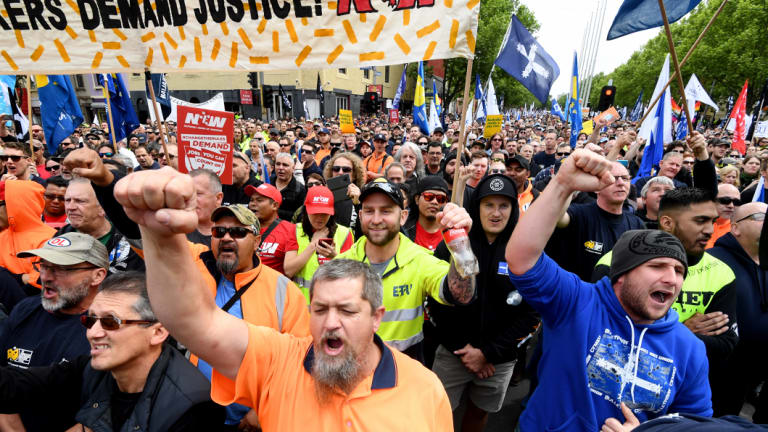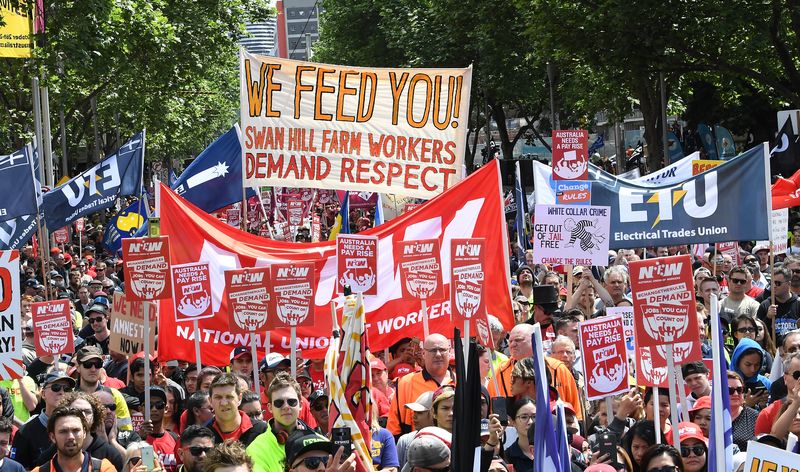 Danny O.
Danny O.VANGUARD - Expressing the viewpoint of the Communist Party of Australia (Marxist-Leninist)
For National Independence and Socialism • www.cpaml.org
Workers around the country are rallying in their thousands with many bravely defying Australia’s draconian and restrictive industrial laws, as well as threats of fines and intimidation from bosses, the federal government, the ABCC and Fair Work.
The rallies, which are taking place over a one-month period between October and November, are part of the ACTU’s ongoing ‘Change the Rules’ campaign aimed at overturning Australia’s “broken work place laws” and follow similar union mobilisations in May earlier this year
Workers in Perth were the first to rally on Wednesday Oct 18 as over 4,000 people gathered in Solidarity Park to voice their anger at Australia’s growing inequality and demand ‘Australia needs a pay rise.’
This was followed on Tuesday Oct 23 with numerous rallies held around the country including in Melbourne, Sydney, Wollongong, Gladstone, Mackay, Townsville, Rockhampton, Cairns, and Darwin.
Rallies are scheduled to be held in other various major cities and regional centres over the next month.
A tale of two rallies
In Melbourne, a massive sea of over 150,000 unionists and supporters filled the streets in a melting pot of diversity and colour. In contrast, the message coming from the union leaders on stage was uniform and monotone. They all spoke of a 3-step plan; 1) re-elect the Daniel Andrews ALP state government in one month’s time at the state election at the end of November 2) remove the Liberals at the upcoming federal election 3) Change the Rules. Just which rules and how we are going to change them wasn’t touched on.
Most alarmingly, not a single speaker spoke of the need to be prepared to continue the fight against a future ALP government after the elections. It was hardy surprising as ALP state premier Daniel Andrews marched side-by-side with union leaders at the head of the rally.
The spectacle had many workers questioning if any lessons have actually been learned from the 2007 ‘Your Rights At Work’ campaign which elected an ALP government on promises of industrial relations reform only to be tied down by the ALP’s very own Fair Work Act.
The rally in Sydney, by contrast, was smaller with 10,000 people taking to the streets, but was much more energetic and militant with workers leading the charge. Several striking construction workers spoke from the stage, as did union leaders from the ACTU and militant unions such as the ETU, CFMEU and MUA. Several speakers explicitly stated that unions and workers will need to continue to fight regardless of who was in government. New ACTU president, Michelle O’Neill told the crowd that it wasn’t “an elect Labor campaign” but a campaign to change the rules.
While more promising than the message coming from Melbourne, with the NSW state election 5 months away, time will tell just how long unions in NSW will continue to hold that line.
Tactics and illusions
 To realistically change the industrial relations legislation in this country in the current conditions will require the removal of the Liberal Party from government. In a two-party system that means the election of the ALP. There is no problem of recognising this as a first step in a broader strategy. But to do so without preparing workers to continue to struggle for their demands regardless of whichever party forms government only spreads dangerous illusions. It spreads illusions that serious change can come from the ballot box; that workers can trust politicians, “independent umpires” or anyone else to fight their struggles for them; that great sacrifice, courage and determination are not required to make serious change.
To realistically change the industrial relations legislation in this country in the current conditions will require the removal of the Liberal Party from government. In a two-party system that means the election of the ALP. There is no problem of recognising this as a first step in a broader strategy. But to do so without preparing workers to continue to struggle for their demands regardless of whichever party forms government only spreads dangerous illusions. It spreads illusions that serious change can come from the ballot box; that workers can trust politicians, “independent umpires” or anyone else to fight their struggles for them; that great sacrifice, courage and determination are not required to make serious change.
History shows reality is far different. Only the most determined, defiant and resolute struggle in our streets, communities and workplaces by workers and ordinary people against all who stand in their way, including ALP governments, has any potential to bring about significant victories for working people. The fight to “change the rules” is no different.